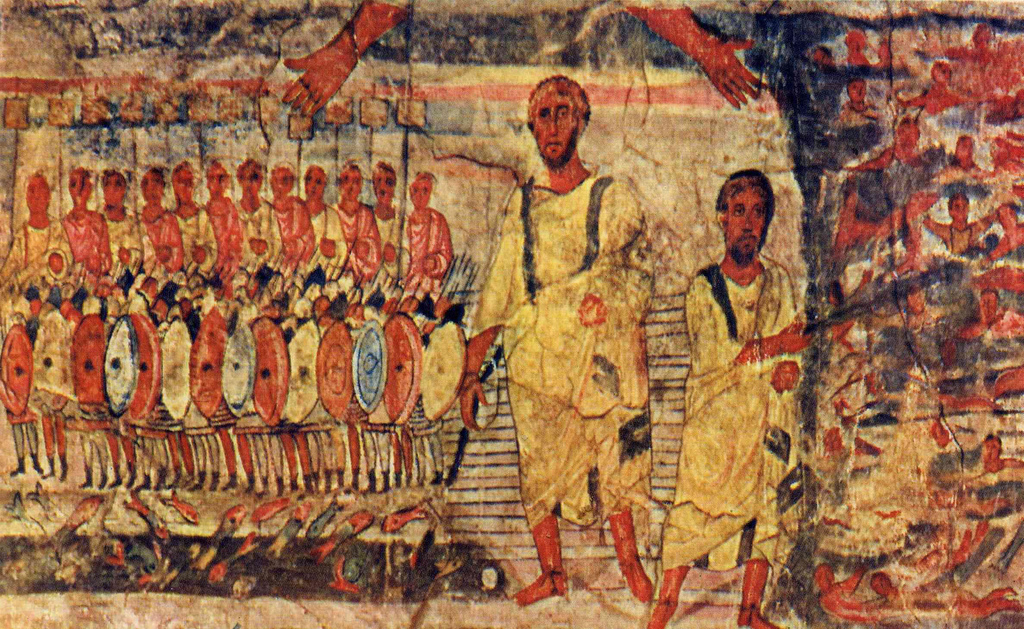Commentary on Parashat Vaera, Exodus 6:2-9:35
If we can speak of a Jewish “liberation theology,” then its roots lie here, in Parashat Vaera, in God’s second revelation to Moses. Their first encounter took place at Mt. Horeb, when God introduced Godself to the reluctant prophet by means of a burning bush. Now Moses has returned to the land of his birth, the land of Egypt/Mitzrayim, where his people suffer the burdens of slavery. Here the Ultimate is introduced once again:
“I am YHVH. I appeared to Abraham, Isaac, and Jacob as El Shaddai, but I did not make Myself known to them by My name YHVH…” (Exodus 6:2-3).
God’s Names
On first reading, this is quite a strange statement. This particular name of God, YHVH (the unpronounceable, ineffable Name), was used quite liberally throughout the book of Genesis, and in fact this is the name that God uses during that first encounter with Moses at the bush! Certainly the patriarchs, and Moses himself, were familiar with this particular name of God?
Rashi, the early medieval commentator, notes that the phrase lo nodati, translated here as “I did not make Myself known,” should actually be read as “I did not become known.” Rashi suggests that what is at issue here is not a particular epithet for God, but an aspect of Godliness that did not “become known” until this moment. Something is being revealed here to that has never been revealed before.

Help us keep Jewish knowledge accessible to millions of people around the world.
Your donation to My Jewish Learning fuels endless journeys of Jewish discovery. With your help, My Jewish Learning can continue to provide nonstop opportunities for learning, connection and growth.
What Does This Name Denote?
The first thing we notice is that the fullness of this name “YHVH” becomes known in the heart of that paradigmatic place of exile and oppression: the land of Mitzrayim. A name that incorporates within it a timeless yet dynamic sense of Was/Is/Will Be, a name that denotes Becoming and Possibility, is revealed to Moses as part of a message about the nature of oppression and liberation. The message continues:
“I have now heard the moaning of the Israelites because the Egyptians are holding them in bondage, and I have remembered My covenant. Say, therefore, to the Israelite people: I am YHVH. I will take you out from the labors of the Egyptians, and deliver you from their bondage. I will redeem you with an outstretched arm and with great judgments, and I will take you to be My people, and I will be your God.” (Exodus 6:5-7)
Stages of Liberation
God here outlines for Moses four stages in the process of liberation. There are many ways to understand these stages. To be “taken out” could refer to being removed–or removing oneself–physically from an oppressive situation. commentators have noted that the first stage in the Israelites’ redemption was actually their outcry to God–that until that point, they were so subjugated that they were not even aware of their own oppression. To be “taken out” could thus also refer to an ability to even understand that one is oppressed, that there is the possibility of being removed from the bondage one suffers.
To be “delivered” may refer to a personal process of dealing with internalized oppression. Here we see the importance of not only removing oneself from the physical situation of oppression, but of removing the internal obstacles to liberation that keep us enslaved.
But liberation cannot remain on the level of the individual. Even if I am successful in achieving some measure of freedom for myself, whether physically and/or psychically, the oppressive situation remains. “Redemption” then refers to a larger process of working with others to address the cause of oppression, to begin to root out those factors that contribute to any type of enslavement or degradation.
But still, it does not end there–for the Israelites were not only freed from slavery, they were freed for the holy work of serving the Ultimate. “And I will take you to be My people” points towards the ultimate goal of our personal and communal freedom: to choose service to that which has ultimate value, beyond the limited human goals of wealth, power, and self-aggrandizement. To serve the Power of Becoming, the Source of Possibility, means envisioning and working to create a world where physical well-being and spiritual fulfillment are possible for every inhabitant of the earth.
To be “taken to” God’s service is to embrace the Possibility of Becoming, to be able to see beyond the constraints of this historical moment, with all of its violence and ongoing oppressions, towards a place of liberation. To know God, according to this text, is to experience the reality of moving from a state of slavery to one of freedom. And this is a communal endeavor, the text makes clear: it is not enough to just free myself.
God & Freedom
This piece of God’s message ends with the words: “And you shall know that I am YHVH your God, who took you out from under the bondage of Mitzrayim.” We come back to what it means to know God/liness in a new way. Through the unfolding experience of liberation, the Israelites will come to truly know God, will have a new awareness of and connection to the Source of Life.
God becomes known in that place where all of us can be free.
Reprinted with permission from SocialAction.com, an online Jewish magazine dedicated to pursuing justice, building community and repairing the world.



